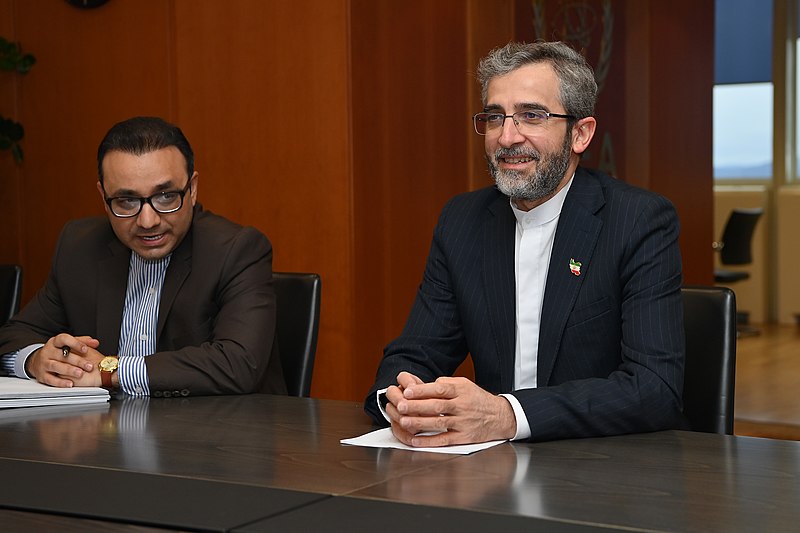The indirect negotiations between Iran and the US that sought to restore the 2015 nuclear deal took place in Doha, Qatar this week. However, following the latest meeting for discussions, no progress was made.
EU envoy Enrique Mora said there was no progress made in the indirect talks between Tehran and Washington to restore the nuclear deal. The talks this week took place after the negotiations were put on hold since the beginning of Russia’s war in Ukraine. Mora said the talks ended without the progress “the EU team as coordinator had hoped for.”
“We will keep working with even greater urgency to bring back on track a key deal for non-proliferation and regional stability,” said Mora.
A spokesperson for the US State Department also confirmed that no progress was made in the indirect discussions – as Iran refuses to directly engage with the US – as Tehran “failed to respond positively to the EU’s initiative and therefore…no progress was made” in the latest round of negotiations.
Mora served as the coordinator of the negotiations between Iran’s lead negotiator Ali Bagheri Kani and US special envoy for Iran Robert Malley in separate rooms in a hotel in Doha.
Iran’s foreign ministry spokesperson Nasser Kanani said Bagheri Kani and Mora “will be in touch about continuing the path and the next stage of the talks,” according to Iran’s Tasnim news outlet.
Progress was picking up on the deal in March but the 11 months of discussions between officials in Vienna were derailed mainly over Iran’s insistence that its Islamic Revolutionary Guard Corps be removed from the US Foreign Terrorist Organization designation.
Another regional rival of Iran, Israel, is also looking to have some influence over the new agreement that would emerge from the indirect negotiations, Israeli defense minister Benny Gantz said Monday. While Israel is not involved in the negotiations, it has raised concerns about the outcome of the deal, along with long-standing threats to take unilateral action against Iran, which has some influence in the west.
“With the expected or possible resumption of the nuclear deal, we will continue to work together with the United States and other countries in order to make our position clear and influence the crafting of the deal - if there is such,” Gantz told reporters.
“It would be proper to make clear that Israel does not oppose a nuclear deal in itself. It opposes a bad deal,” said Gantz.



 China Warns US Arms Sales to Taiwan Could Disrupt Trump’s Planned Visit
China Warns US Arms Sales to Taiwan Could Disrupt Trump’s Planned Visit  Japan Election 2026: Sanae Takaichi Poised for Landslide Win Despite Record Snowfall
Japan Election 2026: Sanae Takaichi Poised for Landslide Win Despite Record Snowfall  Pentagon Ends Military Education Programs With Harvard University
Pentagon Ends Military Education Programs With Harvard University  U.S.-India Trade Framework Signals Major Shift in Tariffs, Energy, and Supply Chains
U.S.-India Trade Framework Signals Major Shift in Tariffs, Energy, and Supply Chains  Trump’s Inflation Claims Clash With Voters’ Cost-of-Living Reality
Trump’s Inflation Claims Clash With Voters’ Cost-of-Living Reality  India–U.S. Interim Trade Pact Cuts Auto Tariffs but Leaves Tesla Out
India–U.S. Interim Trade Pact Cuts Auto Tariffs but Leaves Tesla Out  Trump Congratulates Japan’s First Female Prime Minister Sanae Takaichi After Historic Election Victory
Trump Congratulates Japan’s First Female Prime Minister Sanae Takaichi After Historic Election Victory  New York Legalizes Medical Aid in Dying for Terminally Ill Patients
New York Legalizes Medical Aid in Dying for Terminally Ill Patients  Jack Lang Resigns as Head of Arab World Institute Amid Epstein Controversy
Jack Lang Resigns as Head of Arab World Institute Amid Epstein Controversy  Trump Slams Super Bowl Halftime Show Featuring Bad Bunny
Trump Slams Super Bowl Halftime Show Featuring Bad Bunny  Trump Says “Very Good Talks” Underway on Russia-Ukraine War as Peace Efforts Continue
Trump Says “Very Good Talks” Underway on Russia-Ukraine War as Peace Efforts Continue  Trump Administration Appeals Court Order to Release Hudson Tunnel Project Funding
Trump Administration Appeals Court Order to Release Hudson Tunnel Project Funding  Netanyahu to Meet Trump in Washington as Iran Nuclear Talks Intensify
Netanyahu to Meet Trump in Washington as Iran Nuclear Talks Intensify  Ohio Man Indicted for Alleged Threat Against Vice President JD Vance, Faces Additional Federal Charges
Ohio Man Indicted for Alleged Threat Against Vice President JD Vance, Faces Additional Federal Charges  Japan’s Prime Minister Sanae Takaichi Secures Historic Election Win, Shaking Markets and Regional Politics
Japan’s Prime Minister Sanae Takaichi Secures Historic Election Win, Shaking Markets and Regional Politics  Bangladesh Election 2026: A Turning Point After Years of Political Suppression
Bangladesh Election 2026: A Turning Point After Years of Political Suppression  Sydney Braces for Pro-Palestine Protests During Israeli President Isaac Herzog’s Visit
Sydney Braces for Pro-Palestine Protests During Israeli President Isaac Herzog’s Visit 































